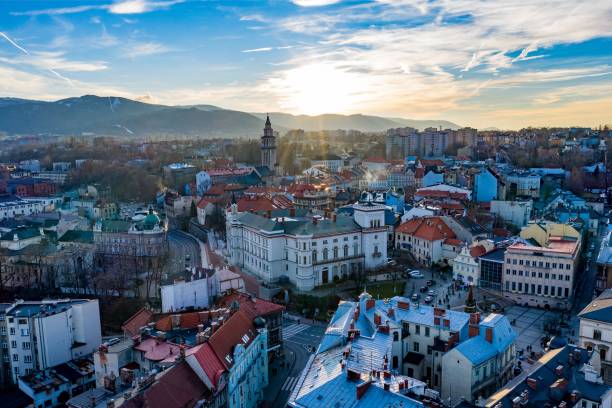In February 2023 after the Energy Measures consortium meeting in Krakow, we, the Oikoplus team, accompanied by Patrycja Płonka, project lead for PNEC (Polish Network Energie-Cités) travelled to southwestern part of Poland.
There, in the city of Bielsko Biała, we explored how residents are adjusting to the current energy crisis and how they work as a community to combat its adverse effects. Bielsko Biała, under the coordination of PNEC participated in the Energy Measures project. During our visit, we were invited into the vice presidents office, met the municipality worker at the most beautiful panorama spot in town and managed to get a glimpse of some public spaces with the residents.
Etymology and a talk with the vice-president.
As we drove down into the city from the surrounding hills, we saw two important characteristics. First of all the city, as later confirmed by the vice president Adam Ruśniak is located in a basin, which leads to issues with air circulation especially during winter season. Secondly we noticed a unique combination of very old houses equipped, as we later learned from the vice president, with old stoves, where residents burn coal and new, modern architecture which stood out thanks to their multiple solar panels and new technology. The first interviewee we met, in front of a huge neo-renaissance Town Hall was the vice president himself. ‘Although Bielsko Biała has a very rich history, we are consciously and very progressively looking at ways to tackle the issues of energy vulnerability‘ he mentioned. Apart from participating in the Energy Measures project, the city ensures that residents have opportunities to receive subsidies for replacing old stoves, installing renewable energy sources or connecting households to central heating network. ‘Together with the president, Jarosław Klimaszewski we make sure that our city is the frontrunner in the energy sector. We offer practical and educational activities simultaneously‘ says Mr Ruśniak.
Housing vs. energy efficiency
As we continued driving through the city laced with small streets and big avenues we recorded the sights of residents going about their daily lives and tried to understand their energy habits based on our observations of large concrete residential blocks mixed with detached family homes. ‘In Bielsko Biała we still have the reminiscence of the traditional way of building’ mentioned the municipality worker later in the day ‘Many existing houses were previously intended to hold multi-generational families. Currently it is an outdated concept and a lot of elderly are left in oversized houses that are too large, drafty and under heated’. In the long run it leads not only to energy poverty, but also to health-related consequences such as diseases of the respiratory or circular systems.
Current and future efforts to minimize energy vulnerability
‘The issues of energy vulnerability and its consequences such as social exclusion, economic hardships or stress are increasingly often discussed in the public debate’ says Patrycja Płonka. A lot of these effects are also present in Bielsko Biała. ‘Our households are burdened by the increase of energy prices’ says one of the female residents as she tightens her large scarf in the cold wind. ‘There are rising prices and progressive inflation, which affects my friends circle and dominates many discussions’ mentions another resident. The new geopolitical situation in Europe has a huge impact on all citizens of Poland. ‘At the same time there are many initiatives, which spark hope for a better future’ says Patrycja Płonka ‘For example in the neighbouring voivodeship, Malopolska, there is a network of energy consultants, who advise residents on their energy usage’. According to the municipality worker, Bielsko Biała also has an eco-counsellor, who works on a local level. ‘The advice we received under the Energy Measures project and outside of it was helpful as my husband and I got information about grants and subsidies available, which we had no idea about’ confirms the townswoman. Currently residents receive tailored advice and individual energy assessment.
As we leave the city we take a last look at the panorama of colourful residential blocks on the backdrop of calm mountains. On the border of Bielsko Biała stands a huge sign mentioning that the city received a governmental fund of over one million zloty and it is clear that the money is invested in multiple ways to help the residents. According to the vice president and the municipality worker apart from financial, advisory and practical help, the city offers a permanent educational campaign aimed at various social groups under the project ‘Bielsko Biała Chroni Klimat’ (Bielsko Biała protects the Environment). Energy vulnerability continues to be a pressing issues, but the efforts to combat it and shape alternative energy behaviours are just as strong.
